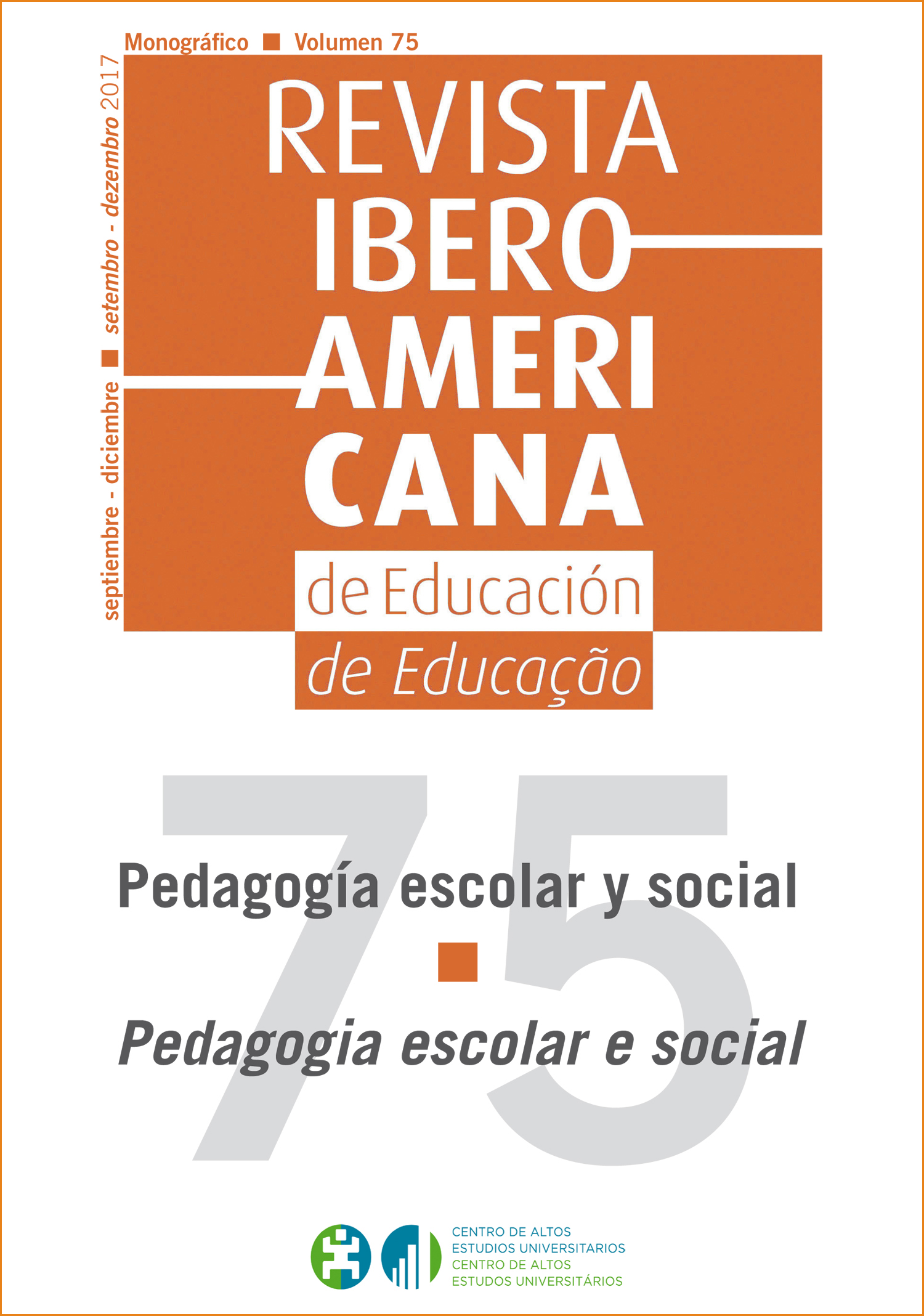Programa de educação em higiene bucal para crianças do ensino pré-escolar em contextos vulneráveis. A preparação psicológica dos pais e o papel dos professores
DOI:
https://doi.org/10.35362/rie7501252Palavras-chave:
habilidades, higiene bucal, ensino pré-escolar, pais de família, professoresResumo
Este estudo tem como objetivo analisar a preparação psicológica dos pais e o papel das educadoras no desenvolvimento de hábitos de higiene bucal infantil, com base em um programa educacional voltado para crianças em idade pré-escolar em contextos de vulnerabilidade social. Participaram 120 pais e mães de família, com filhos entre quatro e seis anos de idade, e nove educadoras pertencentes a oito Centros de Atenção Infantil Comunitária (CAIC). O projeto de pré e pós-teste mostrou que, ao final do programa, os pais apresentaram uma diminuição no senso de autoeficácia para apoiar seus filhos no desenvolvimento de hábitos de higiene bucal, além do que a intenção do comportamento foi maior do que o desempenho subsequente.
As educadoras demonstraram um maior conhecimento sobre cáries e saúde bucal após o programa. Além disso, consideraram a clínica odontológica como a principal fonte de informação sobre higiene dental, seguida pelo promotor de saúde e pela família. Neste sentido, as educadoras também apontaram a prevenção de cáries e de doenças das gengivas como um os principais motivos para manter uma boa higiene bucal. As educadoras não alteraram sua percepção do papel dos professores na prevenção da saúde bucal, o qual teve desde o início uma participação ativa. Tendo em conta estes resultados, são discutidas as implicações para a prática educacional.
Palavras-chave: habilidades; higiene bucal; ensino pré-escolar; pais de família; professores.
Downloads
Referências
Bentley, E.M., Ellwood, R.P. y Davies, R.M. (1999). Oral Hygiene: Fluoride ingestion from toothpaste by Young children. British Dental Journal, 186(9), 460-462.
Chalas, R., Maksymiuk, O. y Fajgier, T. (2014). The evaluation of kindergarten teachers’ preparation to promote oral health among children. Polish Journal of Public Health, 124(1), 33-37.
Clarkson, J.E., Young, L., Ramsay, C.R., Bonner, B.C. y Bonetti, D. (2009). How to Influence Patient Oral Hygiene Behavior Effectively. Journal of Dental Research, 88(10), 933-937.
Dempster, M. y Donnelly, M. (2008). Validity of the Perceived Health Competence Scale in a UK primary care setting. Psychology, Health and Medicine, 13(1), 123-127.
Ehizele, A., Chiwuzie, J. y Ofili, A. (2011). Oral health knowledge, attitude and practices among Nigerian primary school teachers. International Journal of Dental Hygiene, 9, 254-260.
Elfriede, K., Ollis, C. y Davies, S. (2013). Habitual Self-Control: A Brief Measure of Persistent Goal Pursuit. European Journal of Personality, 27, 82-95.
Farooqi, F. A., Khabeer, A., Moheet, I. A., Khan, S. Q., Farooq, I. y ArRejaie, A. S. (2015). Prevalence of dental caries in primary and permanent teeth and its relation with tooth brushing habits among school children in Eastern Saudi Arabia. Saudi Medical Journal, 36(6), 737-742.
Finlayson, T., Siefert, K., Ismail, A. y Sohn, W. (2007). Psychosocial factors and early childhood caries among low-income African-American children in Detroit. Community Dentistry and Oral Epidemiology, 35, 439-448.
Freire, A.R., Luiz, F., De Souza, T. y Puppin-Rontanid, R.M. (2012). Influence of family environment on childrens’ oral health: a systematic review. Jornal de Pediatria, 89(2), 116-123.
Gao, X., Chin Man Lo, E., McGrath, C. y Mun Yin Ho, S. (2013) Innovative interventions to promote positive dental health behaviors and prevent dental caries in preschool children: study protocol for a randomized controlled trial. Trials, 14(1), 1-18.
Gokhale, N. y Nuvvula, S. (2016). Influence of socioeconomic and working status of the parents on the incidence of their children’s dental caries. Journal of Natural Science, Biology and Medicine, 7, 127-129.
Hooley, M., Skouteris, H., Biganin, C., Satur, J. y Kilpatrick, N. (2012). Parental influence and the development of dental caries in children aged 0-6 years: A systematic review of the literature. Journal of Dentistry, 40, 873-885.
Ionas, M. y Dăncilă, A. (2017). Dental care awareness among mothers of children from disadvantaged socioeconomic backgrounds in Romania. Public Health and Management, 22(1), 26-29.
Kenney, M.K., Kogan, M.D. y Crall, J.J. (2008). Parental perceptions of dental/oral health among children with and without special health care needs. Ambulatory Pediatrics, 8(5), 312-320.
Maier, R. y Marian, A. (2015). The teacher-parent educational partnership, health promotion program –specific case- dental health. International Conference of Scinetific Paper AFASES 2015, Brasov, 28-30 may.
Matthews, D.J. (2010). Vulnerability related to oral health in early childhood: a concept analysis. Journal of Advanced Nursing, 66(9), 2116-2125.
Naidu, J. y Nandlal, B. (2017) Evaluation of the Effectiveness of a Primary Preventive Dental Health Education Programme Implemented Through School Teachers for Primary School Children in Mysore City. Journal of International Society of Preventive and Community Dentistry, 7, 82-89.
Simratvir, M. (2011). A study to assess the role of teachers in the promotion of oral health in developing countries. Journal of Education and Ethics in Dentistry, 1, 33-36.
Sultan, S., Ain, T.S. y Gowhar, O. (2016). Awareness of mothers regarding oral health of theory children in Kashmir, India. International Journal of Contemporary Medical Research, 3(7), 2454-2458.
Verplanken, B. y Orbell, S. (2003). Reflections on past behavior. A Self-Report Index on Habit Strength. Journal of Applied Social Psychology, 33(6), 1313-1330.
World Health Organization (2003). The world oral health report 2003. Geneva: WHO. 2003 [actualizado 19 Sept 2016].
Como Citar
Downloads
Publicado
Edição
Seção
Licença
Os(as) autores(as) que publiquem nesta revista concordam com os seguintes termos:















